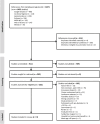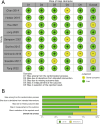A rapid systematic review of the effect of health or peer volunteers for diabetes self-management: Synthesizing evidence to guide social prescribing
- PMID: 39739729
- PMCID: PMC11687712
- DOI: 10.1371/journal.pgph.0004071
A rapid systematic review of the effect of health or peer volunteers for diabetes self-management: Synthesizing evidence to guide social prescribing
Abstract
Social prescribing is a model of care, usually in the community-setting, which aims to address people's unmet social needs. Volunteers support primary health care and community-based care in non-medical roles. However, few studies focus on volunteers in social prescribing, therefore, aimed to synthesize the effect of health or peer volunteer-led interventions on psychosocial and behavioural outcomes for middle-aged and older adults with Type 2 Diabetes Mellitus (T2DM) to inform future work for volunteering in social prescribing. We followed Preferred Reporting Items for Systematic reviews and Meta-Analyses (PRISMA) guidelines and searched six databases and Google Scholar for peer-reviewed studies from 2013+ (last search May 16, 2024). We included randomized controlled trials (RCTs) from all languages, and synthesized data using the Cochrane's Synthesis Without Meta-analysis (SWiM) guidelines; and assessed risk of bias using the "Risk of Bias 2 Tool". We identified nine RCTs (reported in 10 publications). Interventions aimed to promote self-management of T2DM, and study duration ranged from one to 46 months. Training for volunteers varied between one to 32 hours, and most volunteers were offered a stipend. For psychosocial outcomes, only one outcome on social support favoured the intervention group, with the remaining outcomes reporting no differences between study groups. For behaviour, six outcomes (from three studies) favoured the intervention group, and for three outcomes there were no differences between study groups. In conclusion, volunteers bring a unique perspective to health interventions, but volunteer training, matching and retention, as well as intervention mode and duration, and geographical context need to be thoughtfully considered as important implementation factors. This work generates ideas for future studies focused on volunteers and T2DM management and social prescribing. Trial registration: PROSPERO registration: CRD42023453506.
Copyright: © 2024 Iverson et al. This is an open access article distributed under the terms of the Creative Commons Attribution License, which permits unrestricted use, distribution, and reproduction in any medium, provided the original author and source are credited.
Conflict of interest statement
The authors have declared that no competing interests exist.
Figures
References
-
- de Wit A, Mensink W, Einarsson T, Bekkers R. Beyond service production: volunteering for social innovation. Nonprofit and Voluntary Sector Quarterly. 2017;48(2_suppl):52S–71S. doi: 10.1177/0899764017734651 - DOI
-
- Güntert ST, Wehner T, Mieg HA. Definition of volunteer work and a model of volunteer activity. Organizational, Motivational, and Cultural Contexts of Volunteering: The European View. SpringerBriefs in Psychology: Springer, Cham; 2022. p. 1–10.
-
- Gaber J, Oliver D, Valaitis R, Cleghorn L, Lamarche L, Avilla E, et al. Experiences of integrating community volunteers as extensions of the primary care team to help support older adults at home: a qualitative study. BMC Family Practice. 2020;21(1):92. Epub 20200516. doi: 10.1186/s12875-020-01165-2 ; PubMed Central PMCID: PMC7231411. - DOI - PMC - PubMed
LinkOut - more resources
Full Text Sources


